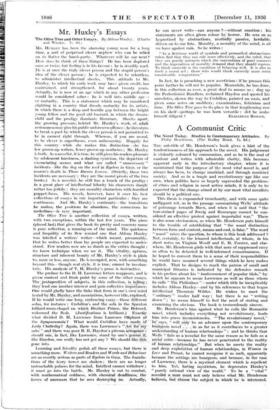Mr. Huxley's Essays
and Windt's. 7s. ild.) • Mu. HUXLEY has been the alarming young man for a long time, a sort of perpetual clever nephew who can be relied
on to flutter the lunch-party. Whatever will he say next?
How does he think of these things? He has been deplored once or twice, but feeling is in his favour : he is steadily read.
He is at once the truly clever person and the stupid person's idea of the clever person ;. he is expected to be relentless, to administer intellectual shocks. This attitude to Mr., Huxley, to which his early work may have given credit, has maintained, and strengthened. for about twenty years. Actually, he is now at an age which in any other profession
would be considered sober : he is well into middle age— or maturity. This is a statement which may be considered slighting in a country that dreads maturity for its artists, in which there is a deep and horrific gap between the bright young fellow and the good old bastard, in which the dream- child and the prodigy dominate literature. Shocks apart, the growing pressure, behind Mr. Huxley's work, of. adult seriousness may give his public unforeseen offence :_he threaten to break a pact by which the clever person is not permitted to be in earnest right through. Whereas, if you are moral, to be clever is superfluous, even unbecoming. Happily for this country—while she makes this distinction—she has few grown-up writers, fewer grown-up aesthetes ; Mr. Huxley is both. As a novelist, it is true, he still gives his readers pleasure by adolescent harshness, a dashing cynicism, the depiction of excruciating scenes and what are called " unnecessary " incidents—like the dog on the roof in Eyeless in Gaza, or the moron's death in Those Barren Leaves. (Strictly, those two incidents are necessary ; they are the moral pivots of the two books.) As a novelist, he still has a touch of the prodigy : in a great glare of intellectual hilarity his characters dangle rather too jerkily ; they are morality characters with horrified puppet-faces. His novels, however, have it over his best collections of essays in brie important particular : they are continuous. And Mr. Huxley's continuity—the transitions he makes, the positions he abandons, the connexions he underlines—is very. important.
The Olive Tree is another .collection of essays, written, with two exceptions, within the last few years. The piece (placed. last) that gives the book its pietty and concrete name is pure reflection, a running-on of the mind. The quickness and limpidity of its flow remind one that Aldous - Huxley was labelled a writers' writer—which meant, presumably, that he writes better than .lay people are expected to under- stand. Few readers now are as dumb as the critics thought : we know technique when we- see it. The vitality, aptness, structure and inherent beauty of Mr. Huxley's style is plain to, more or less, anyone. He is occupied, now, with something beyond this—though real style, it is true, cannot be involun- tary. His analysis of T. H. Huxley's prose is instructive.
The preface to the D. H. Lawrence letters reappears, and is given context and freak point by some of the-other essays.
The juxtaposition of subjects, in this collection,- ; they lendune another interest and gain collective importance. One would gladly have the links that form in one's oirifniind tested by Mr. Huxley, _and associations, however idle i explored.- If he would write one long, embracing essay—those different sofas, for instance : Crebillon's and the sofa in the Spaxton billiard-room-chapel on which Brother Prince, the -Beloved, redeemed the flesh. (Justifications is brilliant.) Exactly what divided D. H. Lawrence from Laurence Oliphant of the Sympneumala -? What would Crebillon have made. of Lady Chatterley? Again, there was Lawrence's "Art sake" and there was poor B. H._Haydon's piteous itirogriiiee..: should one, in fact, like Lawrenee, stand by one's like Haydon, one really has notgot any ? We should liketkis
gone into. . .
Learning and frivolity polish all these essays, -but -there is something more. Writers caul Readers and Words and Behaviour are as overtly serious as parts of Eyeless in Gaza. The Inunda- tions of the ivory tower are shaken ; there are no longer untouchable palaces for themind. Intelleet cannot withdraw ; it must go into the battle. Mr. Huxley is out to combat,
with mathematical -coldness, with chemical deadliness;- the forces of unreason that he sees destroying us. Actually,
he can never write—can anyone ?—without emotion : his statements are often given colour by horror. He sees us as hypnotised by abstractions, morbidly, passive, herclable, driven on to our fate. Morality, a morality of the mind, is all Ire have against ruin. So he writes :
"In a fictitious World of symbols and personified abstractions, rulers find that. they can rule more effectively, and the ruled, that they can gratify instincts which the conventions of good manners and the imperatives of morality demand that they should repress. To think correctly is the condition of behaving well. It is also in itself a moral act ; those who would think correctly must resist considerable temptations."
In fact, he is preaching a new asceticism : if he presses this point further he will not be popular. Meanwhile, he has clone, in this collection as ever, a great deal to amuse us : dug up the Perfectionist Bundlers, reclaimed Haydon and quoted his
anecdotes, shown the way to Crebillon, painted an oasis, and given some notes on snobbery, examinations, fetishism and time. The Olive Tree goes to its place in that lengthening row on his shelf—perhaps he was born versatile f did -he make
















































 Previous page
Previous page